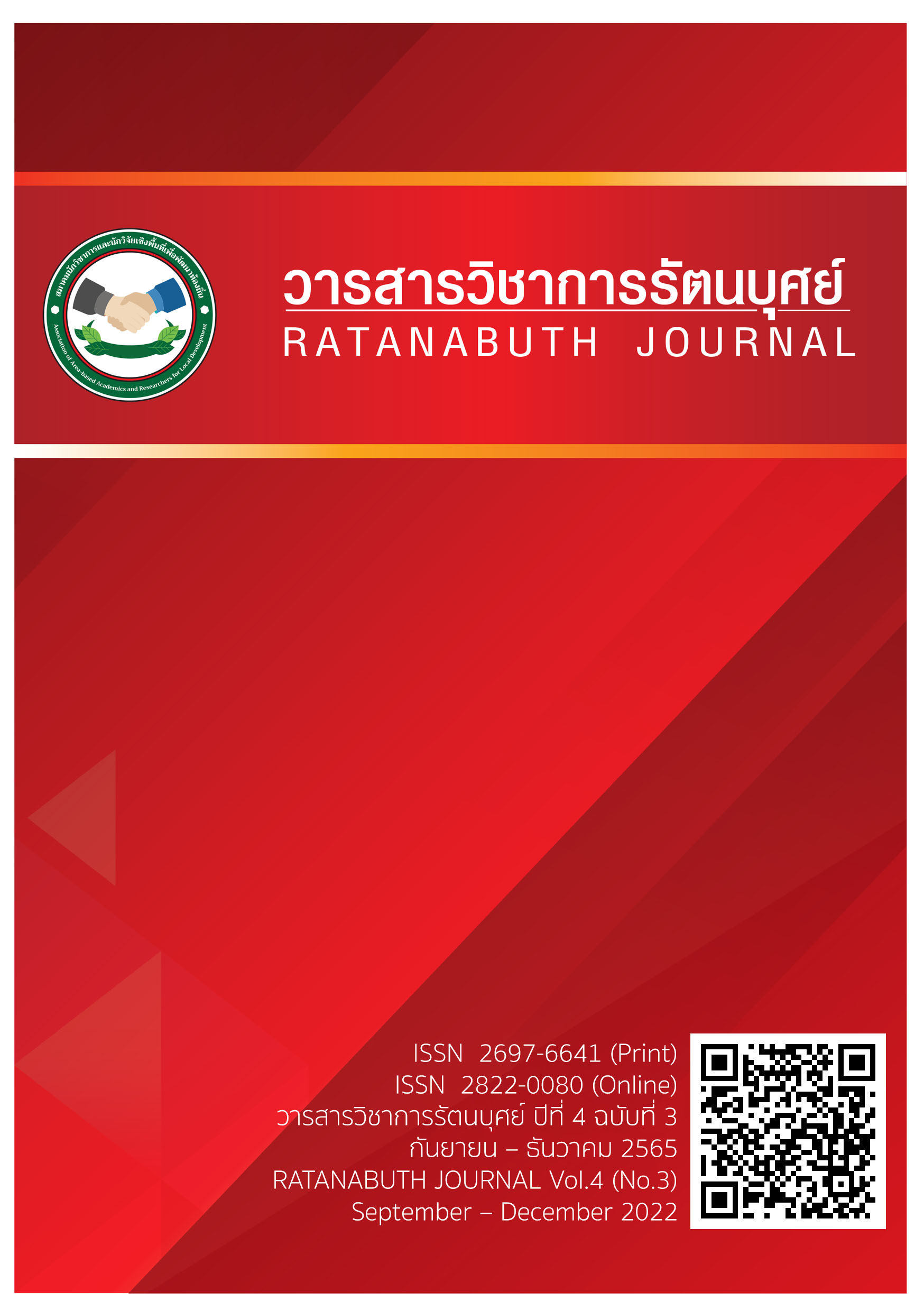The Achievement Assessment for Bachelor of Political Science Program in Government (B.Pol.Sc. 2020) of Mahamakut Buddhist University by Balanced Scorecard Concept
Main Article Content
Abstract
Mahamakut Buddhist University has the intention of producing graduates who are well-rounded and have proper conduct based on the principles of morality and ethics and in line with learning skills in the 21st century that aim to create new knowledge that meets the needs of learners. can be used to improve and develop teaching and learning to have more quality. The purpose of this article is to study 1) To evaluate the bachelor of political science program in government (curriculum revised in 2020) in four components of development of students received from the curriculum; curriculum development process Personnel development and budget and resources. 2) To study the relationship between the standardization of the curriculum and the response to the needs of stakeholders. and 3) Using research results to improve and develop the bachelor of political science curriculum. in accordance with the needs of the learners. current world situation and labor market. this research is a mixed assessment research using the balanced scorecard concept as the main research framework. The research areas are Mahamakut Buddhist University, campuses and colleges. The quantitative research used a sample group of 400 persons consisting of administrators, faculty members, current students alumni and establishment. The samples were calculated by Krejcie & Morgan's calculation method. The results were analyzed and discussed using reference statistics. The qualitative research used the target group of 35 persons. The research process used the purposive selection method, in-depth interview, examination of triangular data, interpretation, textual analysis and synthesis, and discussion of descriptive results.
The results showed that collegian development gained from the course have a very average level . The curriculum development and curriculum contemporary have a high level . The development of educational personnel have a high and budget and course resources have a low . The relationship between curriculum standardization and the ability to respond to the needs of stakeholders found that the curriculum development process perspective It is related to the response to the needs of the stakeholders. Statistically significant (r = 543, p = <.001*) The research findings are that the learning and developmental outcomes obtained from the curriculum reflect the university context that can produce graduates with knowledge and morality at a satisfactory level. Important issues that should be improved are: Reducing the size of some subject groups Increase your English skills Learners have the knowledge and skills of the 21st century, are emotionally intelligent, able to dominate themselves, dominate people, and dominate jobs.
Article Details

This work is licensed under a Creative Commons Attribution-NonCommercial-NoDerivatives 4.0 International License.
References
กาญจนา คุณารักษ์. (2540). พื้นฐานการพัฒนาหลักสูตร. นครปฐม: มหาวิทยาลัยศิลปากร.
กาญจนา คุณารักษ์. (2540). หลักสูตรและการพัฒนา. นครปฐม: มหาวิทยาลัยศิลปากร.
ชาคร คัยนันทน์. (2565). ปัจจัยที่มีอิทธิพลต่อประสิทธิผลในการบริหารหลักสูตรรัฐประศาสนศาสตร-บัณฑิต สาขาวิชารัฐประศาสนศาสตร์ มหาวิทยาลัยราชภัฏมหาสารคาม.วารสารสังคมศาสตร์เพื่อการพัฒนาท้องถิ่น. 6(2) 100-108.
ทิศนา แขมมณี. (2542). การจัดการเรียนการสอนโดยยึดผู้รียนเป็นศูนย์กลาง โมเดลซิปปา.กรุงเทพมหานคร: เดอะ มาสเตอร์ กรุป แมเน็จเมนท์.
เทพศักดิ์ บุณยรัตพันธ์. (2550). เอกสารการเรียนรู้การวิจัยด้วยตนเอง. สถาบันวิจัยและพัฒนา,มหาวิทยาลัยสุโขทัยธรรมาธิราช. นนทบุรี: สำนักพิมพ์มหาวิทยาลัยสุโขทัยธรรมาธิราช.
บันลือ พฤกษะวัน. (2543). จิตวิทยาการเรียนการสอน. กรุงเทพมหานคร: บริษัท คอมแพคพริ้นท์.
ภควัต โอวาท. (2565). การพัฒนารูปแบบการบริหารจัดการศึกษาโดยใช้วิธีดุลยภาพสำหรับโรงเรียนในสังกัดสำนักงานเขตพื้นที่การศึกษามัธยมศึกษาร้อยเอ็ด. ปริญญาการศึกษามหาบัณฑิตสาขาวิชาการบริหารและพัฒนาการศึกษา, บัณฑิตวิทยาลัย: มหาวิทยาลัยมหาสารคาม.
มหาวิทยาลัยมหามกุฏราชวิทยาลัย. (2563). หลักสูตรรัฐศาสตรบัณฑิต สาขาวิชาการปกครอง.คณะสังคมศาสตร์ ภาควิชารัฐศาสตร์และเศรษฐศาสตร์. นครปฐม. (เอกสาร มคอ. 2).
มหาวิทยาลัยสุโขทัยธรรมาธิราช. (2554). การปรึกษาทางจิตวิทยา. คณะศึกษาศาสตร์, นนทบุรี:สำนักพิมพ์มหาวิทยาลัยสุโขทัยธรรมาธิราช.
เรณุมาศ มาอุ่น. (2559). การจัดการเรียนการสอนในระดับอุดมศึกษาอย่างมีประสิทธิภาพ.วารสารเทคโนโลยีภาคใต้. 9(2) 169-176.
วิจารณ์ พานิช. (2556). สนุกกับการเรียนในศตวรรษที่ 21. กรุงเทพมหานคร: มูลนิธิสดศรี–สฤษดิ์วงศ์.
วิชัย วงษ์ใหญ่. (2560). กระบวนการพัฒนาหลักสูตรและการเรียนการสอน. กรุงเทพมหานคร: สุวีริยาสาส์น.
วิฑูรย์ วีรศิลป์ และลักษณา อินทร์บึง. (2563). แนวคิดการพัฒนาอัตลักษณ์ของบัณฑิตทางสาขาวิชารัฐประศาสนสาสตร์. Journal of Modern Learning Development. 5(1). 108-124.
สิทธานต์ ดีล้น. (2560). สื่อการประชาสัมพันธ์ที่มีผลต่อการเข้าศึกษาต่อในหลักสูตรสาขาวิชารัฐศาสตร์ คณะรัฐศาสตร์และรัฐประศาสนศาสตร์ มหาวิทยาลัยราชภัฏมหาสารคามของนักเรียนชั้นมัธยมศึกษาปีที่ 6. บัณฑิตวิทยาลัย: มหาวิทยาลัยราชภัฏมหาสารคาม.
สุนีย์ ภู่พันธ์. (2546). แนวคิดพื้นฐานการสร้างและพัฒนาหลักสูตร. เชียงใหม่: เดอะโนว์เลจเซ็นเตอร์.
Kaplan, Robert S., and Norton David P. (1996 a). The Balanced Scorecard:Translating. Strategies into Action. Boston : Harvard Business School Press.
Oliva, P.F. (1992). Developing the Curriculum. (3ed). New York : Harper Collins.


